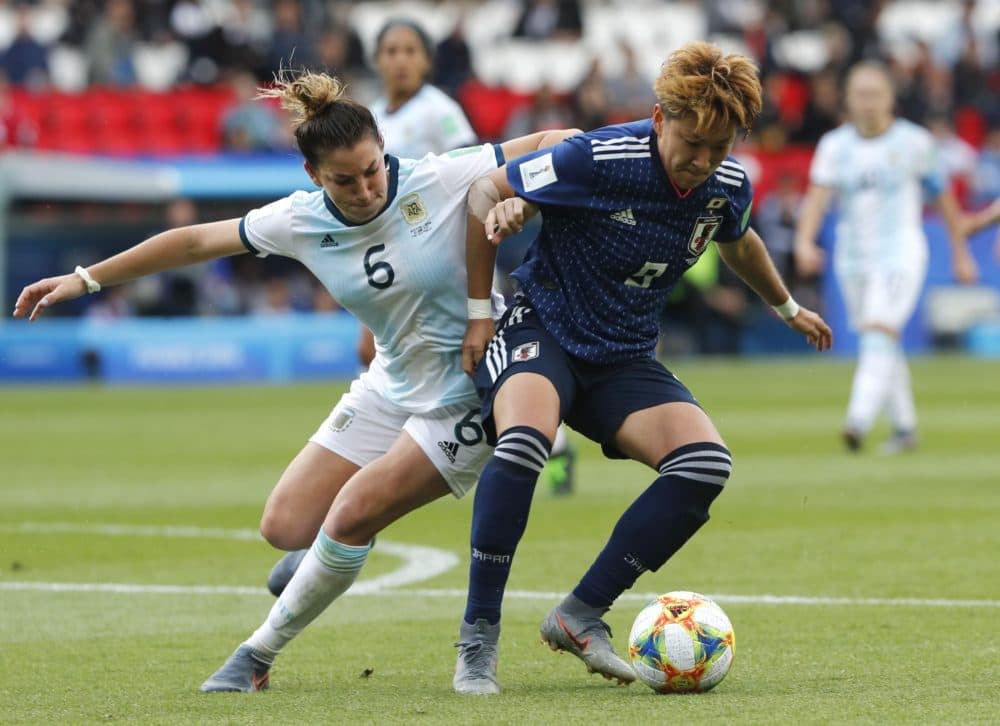Advertisement
Commentary
The U.S. Women's National Team Isn’t The Only Team Fighting For Equality

Want a little swagger with your World Cup? Check out the German women’s national soccer team.
In this promotional video, players call out the citizens of soccer-mad Deutschland. A voiceover says, “We play for a nation that doesn’t even know our names.” The same goes for the team’s accomplishments, including eight European championships and two World Cup titles. Why the anonymity? As the video playfully points out, sexism and stereotypes about women’s soccer. The next thing you hear is this: “We don’t have balls. But we know how to use them.”
And with that, it’s clear there’s something different about the 2019 World Cup underway in France.
Yes, there’s a long, well-documented history of female athletes demanding respect for who they are and what they do. The timeline stretches from Billie Jean King and the "Battle of the Sexes" to the U.S. women’s national soccer team filing a gender discrimination lawsuit in March. And there’s always been an irreverence and edginess — an in-your-face-ness about it all.
But while the U.S. and its top-ranked teams provide fertile ground for campaigns to advance women’s sport, American athletes aren’t alone. The German video is one example of what happens when irreverence goes global. In 90 seconds, it provides an entertaining, slickly-produced glimpse at the changes in attitude and approach now shaping women’s soccer and women’s sports at large.
Around the world, female soccer players are using whatever platform they have to tell some disturbing truths. They’ve called out prejudice, discriminatory practices, misogyny and sexual abuse. They’ve been emboldened and empowered by the U.S. women (who argue that U.S. Soccer "has a policy and practice of discriminating" on the basis of gender), by #MeToo and by their own experiences. All together it’s given the 2019 World Cup a different kind of energy and importance.
"[T]he more you know about Argentina, Brazil and Chile, the more you’ll want to root for them, too."
No doubt Germany has won some fans with its video. But the more you know about Argentina, Brazil and Chile, the more you’ll want to root for them, too. They’ve battled anonymity and disrespect on a greater scale than the Germans. That happens when you play soccer in South American countries where the sports culture worships the men’s teams and sabotages the women’s.
It got so bad in Brazil that five national team players retired in 2017 to protest the firing of their coach, Emily Lima. In her retirement video, Cristiane, one of Brazil’s career scoring leaders, wondered why Lima, the first woman to coach the national team, didn’t get the same chance to succeed as her male predecessors. Cristiane also highlighted how Brazil’s national soccer federation didn’t care what the players needed to compete at the highest level.
Fast forward to Brazil’s tournament opener against Jamaica on Sunday. Cristiane was back in uniform. Her love of the game too strong to keep her away; her talent too overwhelming to deny as she scored a hat trick. Hopefully, the hat trick means more people will follow Cristiane and pay attention to what she says in the future, including Brazil’s soccer powers-that-be. (A sign of better things to come? The video below is closing in on 1 million views.)
In Argentina, players went on strike last September because they weren’t paid their daily stipends of roughly $10. The Argentinians have also dealt with an inferior practice facility (if a dirt field without decent changing rooms even qualifies as a practice facility). In Chile, the players unionized in 2016 to combat poor treatment. The union representing Australia’s players is pushing for prize-money parity and vowing to support future legal action against FIFA, soccer’s international governing body.
There are outspoken players who won’t compete in France, but are an important part of the conversation, too. In Afghanistan, women on the national team bravely detailed how they were sexually abused by the president of the national soccer federation. He’s been banned for life by FIFA and now faces arrest. The Norwegian team is playing without Ada Hegerberg, the world’s best female soccer player. She chose not to play for the national team to protest unequal treatment of female players in her home country. Adding to her frustration, Hegerberg felt she didn’t have a voice in the Norwegian soccer system.
What’s driving all of this? While indignation has been simmering under the surface for years, and in some countries (including the U.S.) for decades, social media has been the perfect accelerator. Social media gives players a voice and global reach. And players have skillfully harnessed it to build outrage and inspire action. Social media also provides a catalog of what works, what connects with bigger audiences and mainstream media outlets.
Right now, women’s teams succeed in spite of their national federations not because of them.
But it’s not all Twitter and Instagram and YouTube videos. Record-setting crowds at women’s games and record-setting sponsorship deals have emboldened and empowered players, too. When 60,739 fans show up to a women’s game in Spain and Barclays agrees to invest in women’s professional soccer in England — with $13.2 million over three seasons — it shows what’s possible and encourages players not only to expect more, but to ask for more.
There’s still a long way to go in the U.S., in Germany, in Brazil, in Argentina, in Chile, in Australia, in Afghanistan, in Norway — really in any country where women play soccer.
Right now, women’s teams succeed in spite of their national federations not because of them.
Keep that in mind when you watch the U.S. women, especially as the defending World Cup champions begin their campaign for a record fourth title. But don’t get hyper-focused on the U.S. The World Cup is better when you take a global perspective and see how growing parity on the field is being matched by growing outspokenness off it. They fuel each other and make the action even more compelling.


